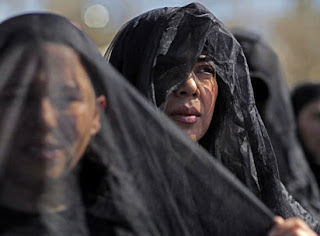This article from chron.com Deals lag, as does Mexico's oil output deals with Mexico not being able to access most of its oil in the Gulf of Mexico because the company Pemex doesn't have the technology for exploration. A recently passed bill will allow Pemex to make deals with foreign companies for oil exploration. This is a big deal, because oil in Mexico was previously state operated. But so far, Pemex hasn't made any deals, so oil production has slumped.
Sunday, February 28, 2010
Mexico bills allows privatization of oil
This article from chron.com Deals lag, as does Mexico's oil output deals with Mexico not being able to access most of its oil in the Gulf of Mexico because the company Pemex doesn't have the technology for exploration. A recently passed bill will allow Pemex to make deals with foreign companies for oil exploration. This is a big deal, because oil in Mexico was previously state operated. But so far, Pemex hasn't made any deals, so oil production has slumped.
Gay Marriage in Mexico

The article, Gay Marriage Puts Mexico City at Center of Debate, from the New York Times, talks about the gay rights movement in
This is a topic that has found its way into every country, and is important to look at when comparing the amount of civil rights given to a country’s people. This issue shows the ideological cleavage between the minority liberals in
Sunday, February 21, 2010
Mexican Military Offensive Against Drug Violence Ineffective
In the Time article How Mexico's Drug War May Become Its Iraq, Ioan Grillo describes Mexico's efforts to curtail drug violence throughout the country, and how its citizens do not have confidence in the military presence. Violence has only increased recently, with January being the bloodiest month in the drug war. The military has also been criticized for only targeting some drug cartels, which strengthens rival cartels. In a poll, half of Mexicans believed the government involvement had only increased the violence, while only 20% thought it had made the country safer. The United States has made agreements with Mexico to work together on security
Drug Wars Hinder Juarez Economy

New Plan for Ciudad Juarez

The article A "dying" city protests from The Economist this past week talks about Mexico's war on drugs and what actions the president has taken to improve the situation.
On February 11th president Felipe Calderon went to the crime infested Ciudad Juarez for a public safety meeting. Ciudad Juarez is Mexico's 5th largest city and is " the world's deadliest city outside a war zone." Mr. Calderon did not get a very warm welcome in Juarez because of the continued rate of violence in the city after three years of the president saying he was combating the drug gangs, and because of the lack of efficiency of the troops sent to stop the violence and murders. The president visited the city again on the 17th seeking to "make amends" for calling the 18 teenagers who were recently murdered at a party "gangsters". This second visit is important because, "although polls showed initial skepticism towards his plan and his visit, on his second trip his talks with community groups suggested broad agreement on the new strategy."
The President's new "emergency plan" calls for an increase of police along with social and economic reforms which are necessary to diminish the power of the drug gangs in the community. These reforms include "investment in health, education, child care and sports facilities." The recession has left many people out of work and out of school, they don't have many alternatives to joining the gangs which is a major problem the president is trying to face in his new plan. New schools, more hospitals, more parks and more cultural facilities need to be built to help Ciudad Juarez grow away from the drug gangs.
Ciudad Juarez's police has been seen as corrupt, and police lines were recently tapped, giving the drug gangs dangerous information. Also, the troops that were sent to the city are not liked by the citizens because of the many illegal searches and overall lack of good they have done. Hopefully much of this will change after these new plans are put in place and real reform will be seen in Ciudad Juarez.
This article is important for Comparativists to look at because it shows public policy in Mexico and it will be important to see how these policies are enacted and how effective they are. This is also important because of the large impact this war on drugs has on the lives of people living in Mexico, and these new reforms could mean a more prominent and active civil society in Ciudad Juarez and Northern Mexico.
Sunday, February 7, 2010
Housing US prisoners in Mexico jails
BBC News article: Schwarzenegger proposes Mexican jails take US inmates
Drug War Obscures Recent Headway in Mexico's Stability
A Mexican Cult

The Economist article, A Mexican Cult: Death in holy orders is about the cult of Holy Death that has been rising in popularity throughout Mexico. Santa Muerte (Saint Death) is not actually considered a Saint by the Church, but "some 2m Mexicans are said to worship [her]." Santa Muerte is depicted as a skeleton holding a scythe and a globe, and wearing a hood and tunic. She is believed to be the protector of both the law-abiders and criminals, so she is popular in many jails, and she is also often shown smoking a joint and accepts offerings of tequila and beer.
Bishop's in Mexico have deemed this cult as satanic, and the government has withdrawn official recognition from churches that recognize and incorporate Santa Muerte. This, and the fact that the government has destroyed about 30 altars devoted to Santa Muerte on the grounds that they were suspected in drug trafficking, has made many followers angry and rallies were held in Mexico City demanding religious freedom.
This article is interesting to look at in Comparative Politics, because it brings up the question of Legitimacy. If the people think that the government is taking away their freedom of religion than that will raise questions as to how democratic Mexico is, and people will wonder how real their Civil Rights actually are.


